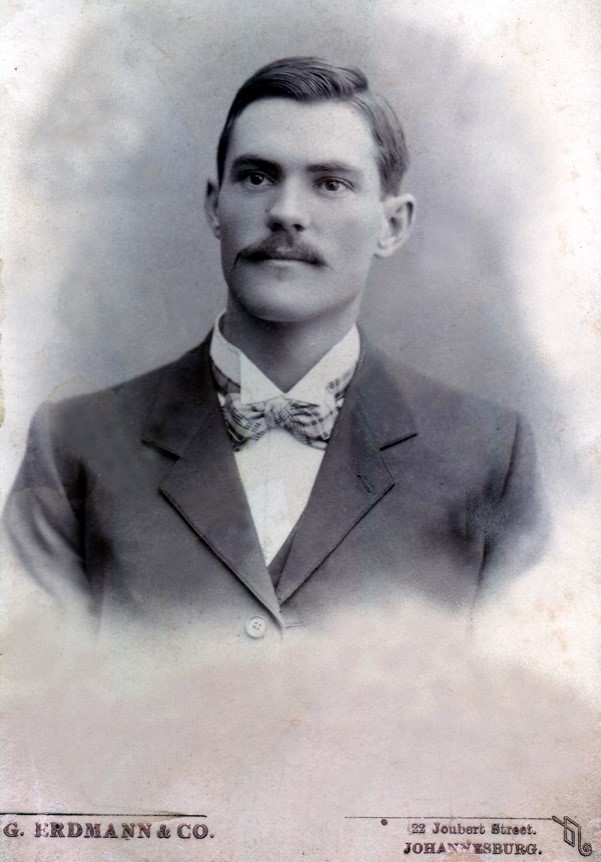Child of: Samuel Gustav Thiel
Walter Samuel Thiel
18 Apr 1880 – 21 Aug 1962
Walter Samuel Thiel was born on 18 April 1880 in Solingen, Germany as the eldest child of Samuel and Ida Thiel. He was not yet 2 years old when his father left for South Africa and one day after his 3rd birthday he arrived with his mother and the rest of the Thiel family in Kimberley where his father was working for the Hess Bakery. Within 2 years his father moved with his family to Beaconsfield where Walter Samuel was sent to the public school at the age of 5. Although he did not know a word of English he mentioned that he felt at home within a week. During a school holiday, when he reached the age of 13, he said to his parents that he did not want to go to school any more and that he wanted to learn a trade. His parents agreed and within a day he started as an apprentice at a Wagon and Farrier business owned by a Mr Axel for 10 shillings a week. Every week he gave his wages to his mother who gave him 1 shilling back to spend on himself. After 9 months his wages were increased to 15 shillings a week and after a year he moved to a larger workshop at Bultfontein mine, owned by the firm Hunt and Reed, where he earned 20 shillings a week. His wages were increased to 30 shillings a week but he was placed in a position where he had to supervise mineworkers and he decided to resign as he wanted to learn a trade. Walter Thiel describes in his memoirs how he was involved in executing several big tasks such as the erection of a huge headgear for a mineshaft. He also describes a narrow escape when 200 tons of rock broke away and crashed down a shaft moments after he had left his perch on a timber across the shaft.
While recovering from a severe injury to his hand, Walter paid a “pleasant” visit to his grandparents and the rest of the Thiel family in Pretoria. On his way back to Kimberley he visited his father’s half-brother, Ernst, working at the Rose Deep Mine in Germiston. His uncle suggested to him that he should seek employment at Germiston and with a recommendation from his uncle Ernst, he started the next day at Glen Deep mine where he assisted with the construction of the plant until its completion. He then decided to seek other employment near Germiston and again through his uncle Ernst he found employment on the Geldenhuys Estate. He found accommodation nearer to his work in Jeppe Extension and cycled three miles to work every day, before moving to stay in a room on Geldenhuys estate. During this period Walter also visited his sister (most probably Mary) in Pretoria where she was visiting their grandparents. In 1898 there was a lot of talk of the coming Anglo Boer War and Walter mentions in his memoirs that “numerous employees were clearing out of the Transvaal —- making it difficult for the mine to carry on.” When the mine at Geldenhuys Estate eventually closed down, Walter was engaged at the Rose Deep Gold Mine “which was being run by the government” until it also closed down when the British troops entered Johannesburg in June 1899.
In the meantime Walter’s uncle Ernst took his family to Lourenço Marques as he thought it better to send them overseas during the war. While he was away, the Mine Engineer of Rose Deep Gold Mine asked Walter where his uncle could be found as he wanted Ernst to take up a position at ERPM Mine to dewater the shafts. Until Ernst returned, Walter took up the position on his behalf. Upon his return Walter was made Acting General Manager on the Kleinfontein Mine. This was around September or October 1900 when Walter was only 20 years old. On Boxing Day 1900 Walter awoke to find that “a contingent of Boers had taken over the mine and were exchanging fire with a squad of RP Regiment who were entrenched in the Apex headgear, the Boers taking cover behind our dwelling houses.” During the skirmish the Boers started to burn down the mine buildings. Walter talked to their leader, Kommandant Snyman, to prevent the damage, pointing out that there was German capital involved but he refused, saying that he was following the orders of General Piet Viloen. Walter also managed to negotiate the release of Mr E.J. Way, the General Manager of the mine, by the Boers as he was not able to defend himself because he could not speak Afrikaans.
Unfortunately Walter’s written memoirs ends here but more information about his life was gained from his eldest son, William Gerard Thiel, and his youngest son, Robert Vorster Thiel. After the war Walter apparently went back to Kimberley where he harvested grain crops for farmers and operated a German water drilling machine for his father. While drilling for water on the farm Eureka near Modder Rivier, he met his future wife, Elizabeth Sophia Vorster. They were married on 27 June 1907 in Beaconsfield, only four months after his mother had passed away. The couple then went to the Transvaal where Walter worked on several mines and their eldest son, William Gerard, was born there. Before 1913 they must have moved back to Modder Rivier as their third son, Philippus Samuel, was born there in 1913. Before 1916 the family moved to Jagersfontein as their fourth son, Paul, was born there in 1916. The boys all went to school in Richie until they reached Standard 8 and then completed their schooling in English at the Kimberley Boys High School. After the birth of their fifth son, Robert Vorster, the family moved to Johannesburg in 1932. The family stayed in Mayfair where Walter passed away in 1962.

